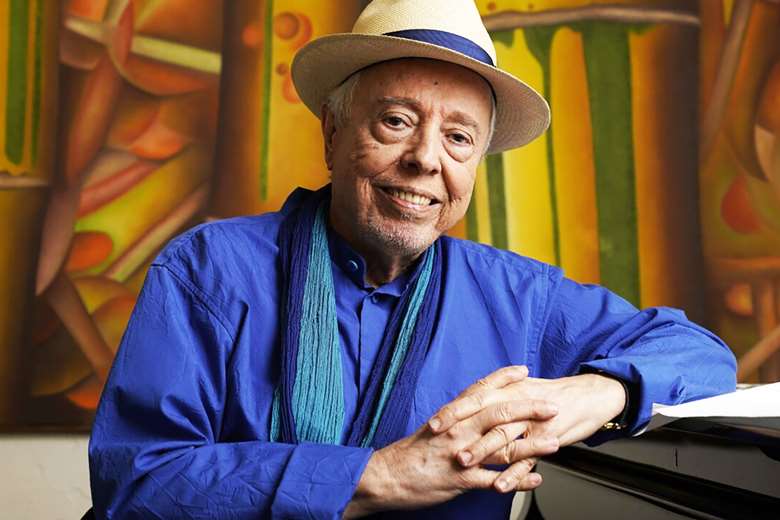Sergio Mendes: 11/02/1941 – 05/09/2024
Monday, September 9, 2024
Kevin Whitlock looks back at the life and music of one of the most influential and universally acclaimed Brazilian musicians of all time, Sergio Mendes, who has died aged 83

Last Thursday (5 September) Sergio Mendes, one of the greatest popularisers of Latin music in Europe and (especially) North America, died after a long battle with Covid-19
The pianist, arranger, composer and bandleader, who founded the Sexteto Bossa Rio (Bossa Rio Sextet) with Paulo Moura, successfully blended bossa nova with American pop, funk and jazz fusion. Although shunned by hardcore jazz fans and Latin purists, his breezy, slick music helped bring the sounds and spirit of Brazil to the Anglophone mainstream; and his appeal lasted decades after the bossa craze of the 1960s fizzled out.
Born in Niterói in Rio de Janeiro's bay area, the young Mendes grew up absorbing the sounds of the city of his birth; despite suffering from osteomyelitis, he won a place at the local music conservatory, where his natural talent flourished. Heis first contact with jazz was at age 15, after hearing a Dave Brubeck album began playing at tea dances and parties before becoming a key figure in the bossa scene, performing at the Bottles club in Copacabana, where he met the great Antônio Carlos Jobim and João Gilberto.
Under the mentorship of Jobim, he got gigs with visiting American musicians and made his first Stexteto Rio album, Dance Moderno, in 1961.
Touring Europe and the US, the ambitious Mendes recorded albums with Cannonball Adderley and Herbie Mann and played at Carnegie Hall. He moved to the US permanantly in 1964 and cut two albums under the group name Sergio Mendes & Brasil '65 with Capitol Records and Atlantic Records.
By this time Mendes seems to have realised that Rio's ‘cool’ music was of huge appeal to non-Latin audiences if it was presented in the bright, airy freshness that US pop audiences liked – and Mendes’ skill at matching Brazilian songs and rhythms against different western styles, from jazz and rock to funk and hip hop; along with astute choices of cover material (The Beatles, Simon & Garfunkel et al) his ear for a catchy tune, was perhaps his greatest talent.
He struck gold in 1966. Newly-signed to trumpeter Herb Alpert and Jerry Moss’ A&M label, he hit on the formula that would make him a superstar. He recruited two female singers, Lani Hall and Bibi Vogel, for a band he named Brasil ’66. Produced by Alpert, their album Herb Alpert Presents Sergio Mendes and Brasil ’66 was a massive hit. It included Brazilian-influenced covers of western pop songs including the Beatles’ ‘Day Tripper’ with lyrics in English, but also featured a reworking of the Jorge Ben classic ‘Mas Que Nada’ sung in the original Portuguese. The album reached the US Top Ten, and ‘Mas’ reached No 5 in the singles charts – the first song in Portuguese to do so.
He thereafter stuck with his trademark sound of two girls singing together in the band, he notched up a further string of hits with Brazilian-influenced US/UK pop covers. In 1967 he toured for the first time with Frank Sinatra, and in 1968 played his first concerts in Japan, where he became extremely popular, returning over 30 times.
In 1971 he played at the White House for President Richard Nixon; and in 1982 was back to play for Ronald Reagan In the 1990s he became a hero for the easy-listening crowd, and in 2006 he won over a new audience when he collaborated with will.i.am and other members of the American rap group Black Eyed Peas.
His career dipped in the 1970s, but he kept on touring and recording – he would release more than 50 albums in his life. In 1992 he was awarded a World Music Grammy for his album Brasileiro, while in 2006 came a startling change of direction with the straight pop album Timeless. In 2015 he played to more than 100,000 fans at Rock In Rio, and in 2020 released the album In the Key of Joy, which was also the title of a 2021 film documentary about his life and career.
Mendes last performed in November last year, when his European tour included a return to the Barbican in London.
He is survived by Gracinha, his wife of more than 50 years, and their two children, Tiago and Gustavo; by three children, Bernardo, Rodrigo and Isabella, from an earlier marriage; and by seven grandchildren.


